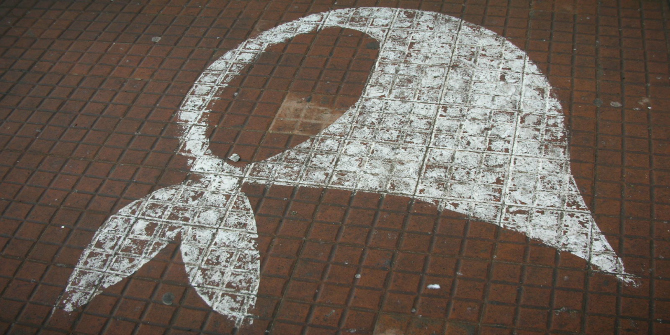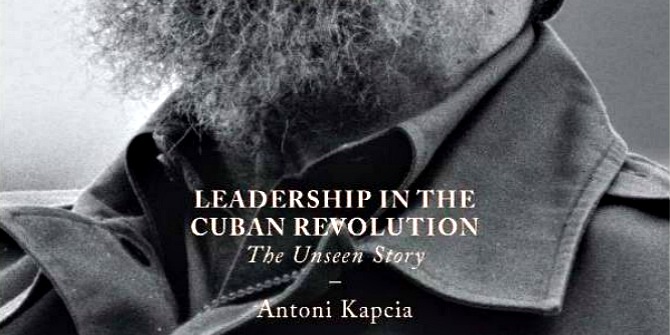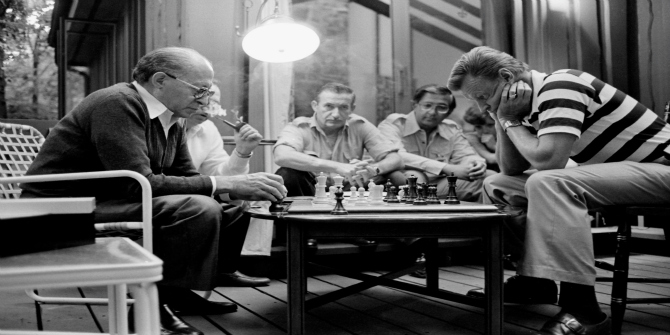In Lovecidal: Walking with the Disappeared, the feminist filmmaker and postcolonial theorist Trinh T. Minh-ha offers a lyrical and poetic meditation on a wounded world mired in perpetual conflict. This artistic book, defying conventional categorisation, draws attention to everyday gestures of dissent by the seemingly powerless that invite us to see love as a creative, transformative act that has the capacity to challenge our conversations on militarism, violence and the meaning of ‘victory’, writes Madeline McSherry.
Lovecidal: Walking with the Disappeared. Trinh T. Minh-ha. Fordham University Press. 2016.
 In 1991, the US media proclaimed Operation Desert Storm a swift American victory. Meanwhile, Saddam Hussein claimed that very same conflict — and the subsequent cease-fire that kept him in power — as a victory of his own.
In 1991, the US media proclaimed Operation Desert Storm a swift American victory. Meanwhile, Saddam Hussein claimed that very same conflict — and the subsequent cease-fire that kept him in power — as a victory of his own.
This is an example of what Trinh T. Minh-ha describes as ‘the transient line between winning and losing’, where conflicts are muddied and victories are neither clear nor objective. But in the mind of Minh-ha, the only real winner is war itself.
A world in a perpetual state of war is the topic of Minh-ha’s latest book, Lovecidal: Walking with the Disappeared. That is, if you can pin down a topic at all. Interspersed with poetry, quotations and abstract digital photography, and imbued with an emotional intensity more common to cinema than war studies, Lovecidal resists definition in both content and form. And such a defiant and artistic work is fitting for its author, who is both a postcolonial theorist and feminist filmmaker.
Though Minh-ha depicts a wounded world mired in conflict, her tone is fundamentally optimistic. Though the ‘illness’ of global militarism and the need to claim victory continues to thrive, potent forms of dissent have risen to confront it, empowering the seemingly powerless to claim ‘victories’ of their own. Stories of such dissent — of individuals who confront imperial domination and resist tyrannical state control — lie at the heart of Lovecidal.
Las Madres de la Plaza de Mayo are one such group of dissidents, whose movement began in 1977 when fourteen mothers in Argentina’s capital began protesting the disappearance of their sons and daughters. Marching in front of the presidential palace, they made their personal suffering a public matter, taking a strong political stand against the military dictatorship. In fact, Minh-ha argues that in their compassionate search for their missing children, Las Madres changed the course of Argentina’s history, setting an important precedent for other protestors to rise up against the government, which fell in 1983.
 Image Credit: Las Madres de la Plaza de Mayo (Richie Diesterheft CC BY 2.0)
Image Credit: Las Madres de la Plaza de Mayo (Richie Diesterheft CC BY 2.0)
But the group was victorious not only because they may have had a hand in toppling the oppressive state apparatus; beyond their political successes, Las Madres — who continue their weekly marches over 30 years later — send a powerful message to a sick and suffering world: that ‘the search for love prevails’ (111). Their movement is a testament to both the extraordinary power of love and the loving power of the ordinary — that a handful of heartbroken mothers can spark a major global political movement.
Minh-ha’s focus on the ordinary encourages readers to reimagine political rebellion. In Tibet, for instance, Minh-ha looks beyond the shock-and-awe of monks who set themselves on fire to identify more subtle acts of resistance to Chinese imperialism. In their efforts to suppress Tibetan culture and identity, the Chinese authorities banned images of Tibet’s spiritual leader, the Dalai Lama. While many have responded by removing the outlawed image, others have also refused to replace it, leaving gaping absences on altars and walls that serve as reminders of both Chinese censorship and the Dalai Lama himself.
Like the protests of Las Madres, these tacit acts of rebellion also illustrate how love can be victorious in the face of oppression. While this may sound clichéd or quixotic, the story of the Drapchi nuns may convince even the sceptical reader. Incarcerated in Drapchi Prison, a place notorious for its inhumane treatment of inmates, fourteen nuns secretly recorded songs and poems and smuggled them out on a cassette tape. Their words were tributes to the Dalai Lama and expressions of love for their homeland: hopeful and life-affirming.
But the songs did not free Tibet, and the Drapchi nuns were punished with increased sentences and severe torture. So how can we believe that love — this weapon of the weak — can overcome militarism and repression? As Minh-ha explains, we must measure victory differently and recognise its subtler forms, which are often obscured by traditional militarised definitions of the term. By drawing attention to commonplace acts of resistance and focusing on the socio-emotional dimensions of defiance, Minh-ha explains that in asymmetrical power relations — and ‘battles a la David and Goliath’ (127) — victory itself is asymmetrical. The oppressed need not topple or eradicate their oppressors; they must simply endure, persist and exist — resisting through everyday acts that reaffirm the dual powers of life and love.
And perhaps it’s true: the nuns’ subversive act exposed the limitations of state power and testified to human resilience in the face of suffering. More than 50 years of tyranny has not succeeded in extinguishing the Tibetan people’s immense love for their long-lost leader nor in quelling their desire for independence. Meanwhile, a global superpower has grown terrified of a single man’s image and a group of singing nuns.
Lovecidal requires that its readers approach its style and message with an open heart as much as with an open mind. At times, the work reads more like a Faulkner novel than scholarly non-fiction, which may frustrate some readers. But for those who welcome dissent, champion alternative ways of seeing the world or favour a critical theoretical approach to politics, Minh-ha’s work will be a fresh and memorable read, illuminating and diversifying our conversations on militarism and mobilisation.
Ours is a lovesick world, but Lovecidal invites us to take part in its cure, walking alongside Minh-ha, Las Madres and other dissidents who see love as a mighty, creative and transformative act.
This review originally appeared at the LSE Review of Books.
Please read our comments policy before commenting.
Note: This article gives the views of the authors, and not the position of USAPP– American Politics and Policy, nor of the London School of Economics.
Shortened URL for this post: http://bit.ly/2gOQ4d7
——————————————–
Madeline McSherry – LSE International Relations
Madeline McSherry is a writer and editor completing an MSc in International Relations Theory at the LSE, where her research centres on discourse and representation in foreign policy. She holds a BA in English and Hispanic Studies from Boston College and has lived and worked in the US, Spain, Switzerland and the UK. Find her on twitter @madmcsherry. Read more by Madeline McSherry.






